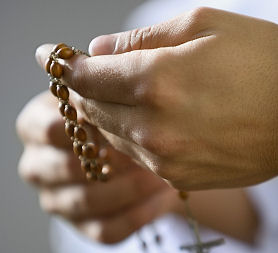Catholic church counts cost of sex abuse payouts
A Belgian cleric has admitted the church has not apologised for child sex abuse due to fears of litigation costs. But an expert tells Channel 4 News the size of UK payouts may not justify such fears.

For many, this week’s announcement by the Bishop of Tournai confirmed what they already suspected, that the Catholic church’s reticence on the issue is as much the result of material concerns as of misplaced prurience.
But there is a significant difference between awards for child abuse in different countries.
Solicitor Richard Scorer, a partner with Pannone LLP, has been involved in several claims against the Catholic church. He told Channel 4 News the biggest-ever payout in this country – for £630,000 – was in 2005, against the Archbishop and Archdiocese of Birmingham.
That calculation was based on a claim for such things as past and future loss of earnings. The actual damages for abuse in the case amounted only to £50,000.
“The biggest awards in child abuse cases are those involving people with essentially upper middle-class backgrounds because you can argue for greater potential loss of earnings,” he said.
That stands in contrast to countries like the United States, where much larger awards have been paid out to individuals.
"Generally, the church has tried where possible to employ confidentiality agreements in settlements."So while we can say there have been awards against the archdiocese of Birmingham, what is not known publicly is how much the church has paid out in settlements where the parties have agreed they should remain confidential."
Richard Scorer Association of Child Abuse Lawyers
“In the US you get very big awards because they are made by juries, who can reflect their anger,” says Richard Scorer. “In this country awards are made by judges under the rules of normal personal injury cases.
“They don’t seek to punish the wrongdoer but to put the victim in the financial position they would be in without the abuse.”
Nevertheless, Mr Scorer understands there are instances of sexual abuse at Catholic private schools in this country that have been settled using confidentiality agreements.
“It’s reasonable to assume some of those might have involved quite substantial amounts because of the nature of the claimants.”
He goes on: “Generally, the church has tried where possible to employ confidentiality agreements in settlements.
“While we can say there have been awards against the Archdiocese of Birmingham, what is not known publicly is how much the church has paid out in settlements where the parties have agreed they should remain confidential.”
The treatment of Father Michael Hill is a case in point. A known paedophile, he was moved in 1985 to the chaplaincy at Gatwick airport by the former Archbishop of Westminster Cormac Murphy O’Connor, at the time bishop of Arundel and Brighton.
The Catholic church settled early cases of abuse involving Father Hill subject to confidentiality agreements – but those were subsequently leaked.
Secular law versus canon law
The relatively small amounts paid out by UK courts undermine the claim that the church’s reluctance to deal with clerical sex abuse is motivated alone by fear of financial retribution.
Peter Garsden, president of the Association of Child Abuse Lawyers, agrees. He told Channel 4 News: “By its nature, the Catholic church is secretive, as is evidenced by documents created as long ago as the 1960s. They have driven the cover-up of child abuse scandals down the years.
“In the cases we deal with there have been many cases where technical examples have been used in an effort to defeat claims. They assert that a priest is not employed by the church and is, rather, someone who is following a vocation to a religious calling.
“As such, he has a responsibility within the parish to look after its subjects and therefore isn’t employed by the Catholic church at all.”
"I would say it is inappropriate to ask someone to investigate abuse when they're tainted with allegations from the past.
"Child abuse, per se, is a subject beset with emotional overlay, thus making it fundamentally important that whoever runs an investigation is completely dispassionate."
Peter Garsden child abuse lawyer
For Richard Scorer the church’s apparent reluctance to deal properly with the problem comes down to a clash between secular and canonical law. “There is still within the church a strong emphasis on the primacy of canon law.
“Effectively, the church finds it very difficult and is very unwilling to get away from this parallel canon law system of dealing with these issues.”
That ambiguity lies at the heart of the Vatican’s decision in 2010 to appoint someone like Cormac Murphy O’Connor – someone who is clearly not independent – to look into the Irish church’s response to the problem of child sex abuse.
What the Vatican is doing, in the view of Richard Scorer, is “seeking to give the impression that they’re saying that allegations should be reported. But when you burrow into the detail, I think there’s an attempt to give an impression that the church will cooperate with the civil authorities, but in fact that’s not what they’re saying.”
Peter Garsden agrees: “Child abuse per se is a subject beset with emotional overlay, thus making it fundamentally important that whoever investigates it should be completely dispassionate.”